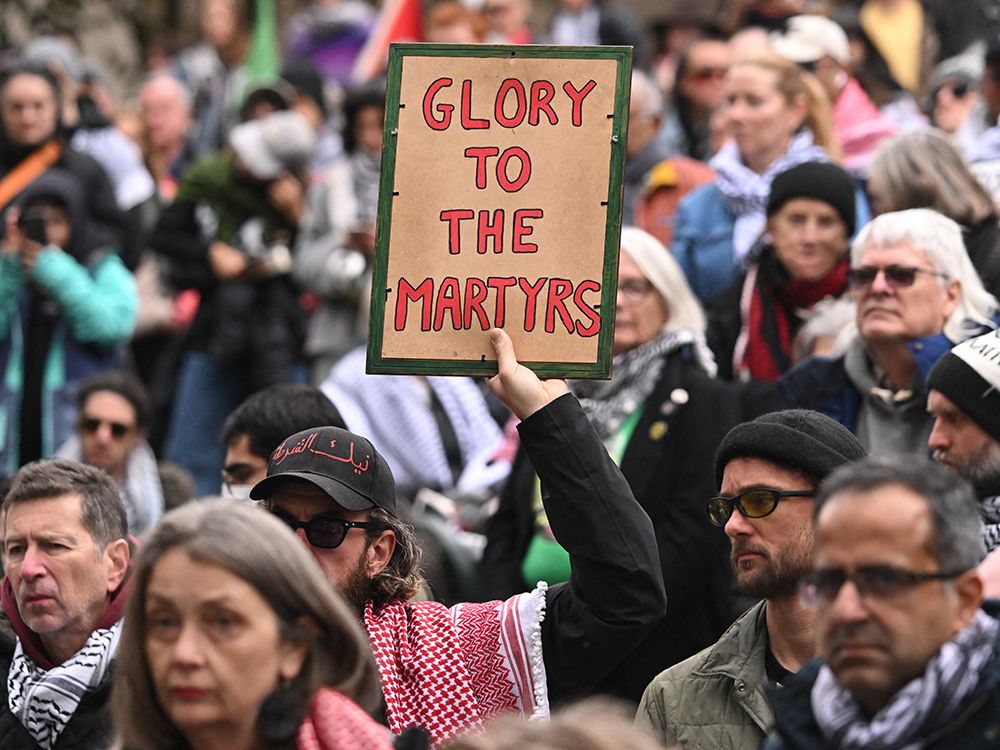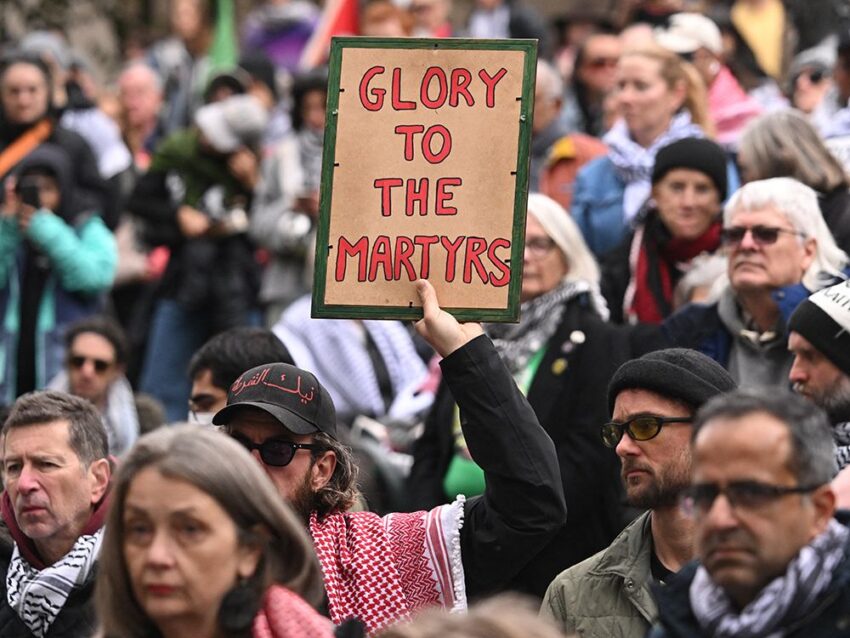
In a late afternoon press conference in Ottawa, Mark Carney announced that Canada intends to break with 75 years of foreign policy tradition and
unilaterally recognize a Palestinian state
, following a lead set by France and Britain.
He said the level of human suffering in Gaza is “intolerable and rapidly deteriorating” and laid the blame at the door of the Israeli government.
Canada’s traditional position has been to push for the establishment of a Palestinian state as part of, but not before, a negotiated two-state solution: it has long dangled statehood as an incentive to bring the Palestinians to the table.
“This approach is no longer tenable,” the prime minister said. “Prospects for a two-state solution have been steadily and gravely eroded” by the threat of Hamas terrorism and accelerated settlement building across the West Bank by Israel.
Preserving a two-state solution means standing with people who choose peace over violence, which is why Canada intends to recognize the state of Palestine at the 80th UN general assembly in September, he said.
But if the goal is to bring peace to the region this is a mistake.
It might be a case of stating the blindingly obvious, but such a move would vindicate Hamas’s strategy that jihad, violence and bloody sacrifice are the only ways to get what you want; that the chain of events that led to statehood started on October 7th.
Rather than drawing Hamas towards a ceasefire, this initiative is having precisely the opposite effect.
Predictably, with the tide of global public opinion, if not the war, turning in its favour, Hamas is no longer interested in a ceasefire. The
U.S. recalled its negotiating team from Doha last week
, as special envoy Steve Witkoff said there was a “lack of desire” on the part of Hamas.
As British-Israeli former hostage Emily Damari
posted on social media in response to U.K. prime minister Keir Starmer’s statement
, recognition does not promote a solution, it prolongs the conflict. “The move does not advance peace, it risks rewarding terror,” she said.
In Ottawa, Carney said recognition of statehood is dependent on the Palestinian Authority committing itself to “much needed” reforms.
He said the PA’s 89-year-old president, Mahmoud Abbas has agreed to hold general elections in 2026, has assured Canada that he will not militarize a Palestinian state, and guarantees that Hamas will play no part in Gaza’s future.
But, as anyone who has studied the politics of the Holy Land for more than two minutes knows, Abbas is as much use in a crisis as a sheep.
For one thing, he does not control Gaza and has not done so since 2007, when Hamas violently booted Abbas’s Fatah from the Strip.
For another, he has promised to hold elections since he was elected to a four-year term in 2005. He repeatedly cancels them — as he did last in May 2021.
Abbas has said he is prepared to recognize the state of Israel, but he has never given up on the core, non-negotiable demand of the right of Palestinian refugees and their descendants to return to Israel.
Had Carney won that concession, we might have something to talk about here.
As it is, any commitment from Abbas to democratize or demilitarize Gaza is worthless.
Against that, the fact that Western countries are deserting Israel is entirely its own fault.
Carney’s criticism that the Israeli government has failed to prevent the rapidly deteriorating humanitarian crisis in Gaza is legitimate.
Even supporters of Israel concede that Benjamin Netanyahu erred when he stopped all aid to Gaza in March, at the behest of his far-right coalition partners.
He compounded the mistake by assuming responsibility for all aid and food distribution to civilians under the Gaza Humanitarian Foundation initiative, that created aid hubs outside population centres and resulted in the deaths of hundreds of Gazans.
These policy errors have created the very real prospect of mass starvation. Research from Hebrew University indicates that flour prices have increased 80-fold. Even Donald Trump has said that there is “real starvation” in Gaza.
Israel has responded by
announcing changes to aid operations
: more air-drops of pallets of food; “pauses” in combat operations for 10 hours a day in populated areas; and the opening of humanitarian corridors to provide secure routes for United Nations agencies.
But it is all too late.
Three-quarters of Israelis want an end to the war (if Hamas releases all 50 remaining hostages, of whom only 20 are thought to be still alive).
They are increasingly aware of Israel’s pariah status.
Public opinion across the West is uniting in opposition to Israel. A new Gallup poll this week suggests only one third of Americans support the Jewish state, down 10 points from last September, while six in 10 disapprove. Earlier polls indicate similar levels of support in Canada.
Hamas, which has called on all nations to follow France’s lead, must be delighted.
As veteran Israeli journalist Nadav Eyal told the Call Me Back podcast, Hamas has always tried to convince the world that Gaza is the victim of a genocide, in pursuit of the legitimacy it needs for nationhood. Those efforts have proven to be in vain until now, when the facts on the ground have supported such claims.
“This was always the project of Yahya Sinwar (the late former Hamas leader) — that only through violence would the state be born, through sacrifice and jihad,” he said.
The prospect for statehood has long been held out as the reward for agreeing to live side by side with Israel in peace.
Former Israeli prime minister Ariel Sharon raised the possibility of Palestinian statehood two decades ago, on condition that the Palestinians demilitarize and give up on claims of “the right of return” to Israel.
While it is true that no talks between the two sides have been held since 2014, in time the prospects for a lasting peace may improve. It makes no sense to have pre-emptively handed over a bargaining chip that could increase the chances of a lasting resolution.
Canada’s backing for Palestinian statehood would not make it a reality. The U.S. remains firmly opposed and will wield its veto on the Security Council at the United Nations.
But momentum is growing. In the last UN vote in May 2024, 143 countries voted to recognize an independent Palestine (Canada abstained).
It was not clear what anyone was recognizing. Did it include East Jerusalem as capital of the new country? Did it grant legitimacy to the Fatah government in the West Bank or Hamas in Gaza?
The only certainty is that Hamas wants a one-state solution from “the river to the sea.”
It is time for Israel to end a war that is not going its way. All of Canada’s energies should be directed towards helping with that goal, rather than giving succour to Israel’s enemies.
National Post
